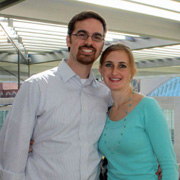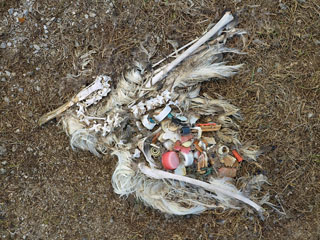
The remains of an albatross on Midway Island who died from eating plastic. Photo by Chris Jordan.
August 21, 2012
Back in 2010, Plano resident Melanie Rummel read about a heart-wrenching environmental crisis. Thousands of birds are dying every year on Midway Atoll islands in the Pacific from eating plastic. The debris is washing up from the nearby Great Pacific Garbage Patch, an area in the ocean twice the size of Texas. It is comprised of mostly floating plastic washed from the surrounding continents and corralled by ocean currents.
The Midway albatross are mistaking it for food.  “We can’t keep contributing to this,” said Melanie.
“We can’t keep contributing to this,” said Melanie.
Inspired by the movie No Impact Man,” about a family who reduces their environmental footprint, Melanie and her husband, Mark, decided to kick plastic for a year. Their goal was to quit buying anything made of or packaged in plastic.
Mark and Melanie Rummel. Courtesy of the Rummels.
The plastic "fast" proved challenging, but they found they not only could adapt to their plastic-free lifestyle, they enjoyed getting back to basics.
"[Giving up plastic] had a huge impact on our life in a very positive way,” said Mark. “We were thinking this would be good for the planet. We didn’t realize how good it’d be for our health and our home.”
They documented their year-long journey with a blog called NoNewPlastic.com. The result is a fascinating look at how pervasive plastic is in our society. It’s also a testament to the tenacity of this young couple.
“Right away, we became very aware of how much plastic we were using that we weren’t aware of before,” said Mark.
Early on, they discovered eating out was a virtual plastic mine-field. When ordering drinks, they learned to quickly tell waiters “no straws,” otherwise drinks would arrive with plastic straws in them. Visiting a favorite fast food restaurant, they scored a victory when they talked the server into putting their salads in paper cups. However, they soon discovered all the utensils were plastic. Thinking outside the box, they grabbed some wooden coffee stirrers and used them as chopsticks.
They began eating at home more and making homecooked meals prepared with fresh ingredients from scratch. They made their own reusable produce bags and started buying everything in bulk.
“We completely revamped how we ate. We couldn’t buy packaged or processed food,” said Melanie. “We really learned a whole new way of cooking.”
But then they got into the hard stuff. What to do about tissue paper and hygiene products that came in plastic? The Rummels were not to be swayed from their mission. Melanie sewed washable single-use tissues from cloth. She even made washable cloth T.P., which they discovered they preferred over scratchy paper. As for deodorant, Melanie created a homemade version with baking soda and cornstarch, which she admitted failed miserably. However, they preferred their homemade laundry detergent, made from borax, baking soda and a bar of castille soap, over store-bought brands.
There were some products on which they compromised. For example, they didn’t give up lap top computers and cell phones, saying that forgoing “single-use” plastic was their main target.
“We’re not anti-plastic. We recognize plastic does have value,” said Melanie.
After the year was over, the Rummels returned to buying some items with plastic packaging for convenience. However, they are still conscious of what they purchase. Now they are enjoying a new challenge - living in DFW without a car. The couple, who both work at home, live near a walking and biking trail system. They use DART for getting around Dallas or borrow a relative’s car. An electric car might be in their future, but for now, they’re enjoying their car-free lifestyle.
“We feel happier and healthier being out in nature, walking more,” said Mark. “Going green is usually characterized as sacrificing but it doesn’t feel like a sacrifice or a burden. We’ve increased the quality of our lives.” On the Web:
On the Web:
Chris Jordon’s documentary photography project on the Midway Island albatross.
Stay up to date on everything green in North Texas, including the latest news and events! Sign up for the weekly Green Source DFW Newsletter! Follow us on Facebook and Twitter.









